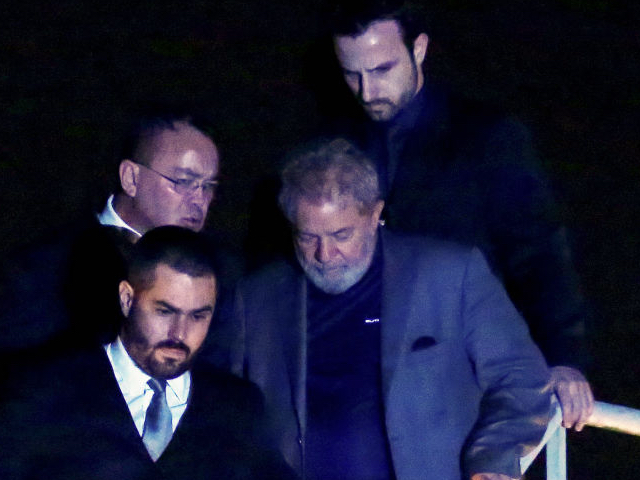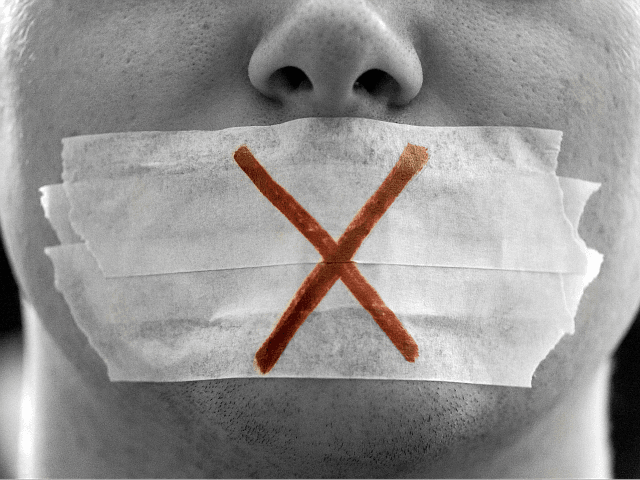Brazil’s Superior Electoral Tribunal (TSE), the federal election oversight body, announced on Thursday the widespread censorship of campaign materials referring to socialist former President Luiz Inácio Lula da Silva as “corrupt” or “a thief,” references to his 25-year prison sentence on corruption charges.
Lula is running for president and leading in the polls despite his criminal conviction, because the nation’s top court, the Supreme Federal Tribunal (STF), overturned the conviction last year. Lula was found guilty and sentenced to prison for 25 years for using money from bribes – in turn, churned into a private contractor from taxpayers’ funds in a scheme known as “Operation Car Wash” – to buy a luxury beachfront duplex property. The STF undid the sentence — on the grounds that the judge originally presiding over the case, Sergio Moro, was allegedly biased against Lula — but did not challenge the facts of the case.
Sergio Moro was elected to the Brazilian Senate this month.

Brazilian ex-president (2003-2011) Luiz Inacio Lula da Silva arrives at the Federal Police headquarters where he is due to serve his 12-year prison sentence, in Curitiba, Parana State, Brazil, on April 7, 2018. (HEULER ANDREY/AFP via Getty Images)
The STF and TSE are currently both led by Minister (the Brazilian title for Supreme Court justices) Alexandre de Moraes, a zealous “anti-fake news” crusader who infamously ordered violent police raids against comedians, YouTubers, and other civilians supporting conservative President Jair Bolsonaro for allegedly spreading “disinformation.”

Brazil’s President Jair Bolsonaro speaks during the launching of his re-election campaign for the upcoming national elections in October, in Juiz de Fora, Minas Gerais state, Brazil, on August 16, 2022. (MAURO PIMENTEL/AFP via Getty Images)
Bolsonaro and Lula are currently in a dead heat in the nation’s presidential election. After Lula narrowly defeated Bolsonaro in the first round of voting on October 2 – but not by enough to avoid a runoff election – the two have engaged in a heated, insult-laden campaign that has featured accusations of cannibalism, satanism, and pedophilia.
Brazilians will elect their president on October 30.
The TSE’s public statement suspending campaign advertising linking Lula to corruption, in which he was convicted of engaging, followed allegations levied in an outraged editorial on Wednesday by the network Jovem Pan, which claimed that the agency had banned its talent from mentioning Lula’s court troubles in their entirety, “the context doesn’t matter.”
The TSE’s announcement began by decreeing that “the digital platforms responsible for Twitter, Instagram, Tiktok, and Facebook” had to take down content associating Lula with “drugs, murder, censorship, abortion, church closures, among other accusations.” The platforms face a fine of 50,000 reais ($9,658) for every day the banned content appears on them.
“In a similar decision, the ministers ordered the immediate suspension of the broadcasting of campaign advertising by reelection candidate Jair Bolsonaro claiming that Lula is not innocent, referring to him as ‘corrupt’ and a ‘thief,'” the TSE subsequently announced. The Bolsonaro campaign similarly faces a fine of 50,000 reais for every time campaign materials air that violate the order.
The TSE judge imposing the fine claimed that the Bolsonaro campaign ads referring to Lula as corrupt “make offenses that go beyond mere political criticism.”
In the past two weeks, the Lula campaign has used designated television time to accuse Bolsonaro of cannibalism and Lula himself has claimed that Bolsonaro is guilty of “pedophile behavior.”
The TSE decision appears to affect only those campaigning directly, not independent media outlets. It follows accusations from the television network Jovem Pan on Wednesday, however, that it had been totally silenced in relation to Lula’s conviction.
“There is no other way of looking at this question: Jovem Pan is, since Monday the 17th, under censorship instituted by the Superior Electoral Tribunal,” the network said in an extensive statement. “We cannot, in our programming – on radio, on TV, and on digital platforms – speak about the facts involving the conviction of Workers’ Party candidate Luiz Inácio Lula da Silva.”
“The context doesn’t matter; the determination of the Tribunal is that these issues cannot be addressed in the journalistic programming of the station. Censorship,” the network denounced.
“What causes shock, concern, and is the motive for great indignation is that precisely those who should be the most solid pillars in the defense of democracy are today working to weaken it – and they do so through the relativization of the concepts of freedom of the press and expression,” Jovem Pan continued, “promoting the restriction of free circulation of journalistic content, ideas, and opinions.”
According to CNN, Jovem Pan journalists face a fine of 25,000 reais ($4,838) for any content violating the order.
Supporters of the move have claimed that the TSE is being lenient with Jovem Pan by allowing it to continue to broadcast at all.
“The Electoral Justice was restrained,” a “jurist” named Peter Serrano told the Brazilian media network UOL. “It did not suspend the activities of Jovem Pan. It could have done so. It could even challenge Bolsonaro’s candidacy because of his type of conduct.”
Past polls have indicated that silencing the reality of Lula’s conviction would likely benefit him. In February 2018 – prior to his imprisonment, when he was still considered a presidential contender – a poll found that one in four Brazilians were not even aware of the fact that he was convicted. His sentence at the time was only about a decade in prison; an appeals court later increased that to almost 25 years.
Mixed 2018 polls also found that, while nearly half of Brazilians wanted to see Lula on the ballot, 53 percent said they wanted to see him in prison.


COMMENTS
Please let us know if you're having issues with commenting.